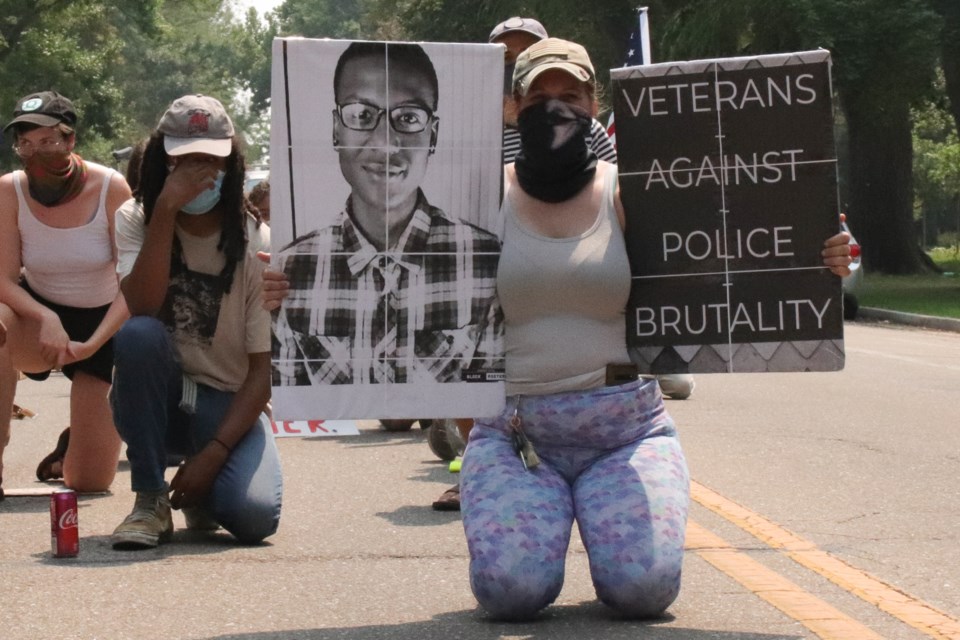About 100 people weathered the near-100 degree heat Saturday afternoon in a demonstration against local and nationwide racial injustice. Activists, young and senior, donned face masks and sun protection as they gathered at Sixth Avenue and Main Street before marching south along Main on a route that would lead them to Roosevelt Park.
Advocates in Longmont have demonstrated throughout the summer in an effort to increase awareness of local and national cases of racial injustice. Saturday, demonstrators taking part in the Longmont 4 Racial Justice Protest stayed true to their message, honoring the memory of Elijah McCain, who died one year ago this week after Aurora police placed him in a chokehold, and advocating for justice for Jorge Rodriguez, who was assaulted by a white man on Aug. 9 near Garden Acres Park. Many attendees also held signs supporting democracy and the U.S. Postal Service.
In addition to maintaining momentum for awareness, Saturday’s event was about engaging youth. The event was organized and promoted by area 17- to 23-year-olds, like Emma Myers, 20, who got involved to “put my money where my mouth is,” and with support from the Boulder County Collective, or BoCoCo.
Lewis Fowler, a 23-year-old student at the University of Colorado Boulder, said he wants to see young people more active.
“People need to get out and do something, not just post on social media,” Fowler said.
Twenty-three-year-old Arianna Ngnomire grew up in Boulder County and works with BoCoCo to advocate for a different approach to some of the issues that hit Black, Latinx and queer communities hardest, such as public safety, wellness, urban development and education. She said young people, inspired by the courage of fellow youth movements like that of the Parkland, Fla., students, are in a strong position to get more involved in issues that will shape their future.
“The beauty of youth right now,” she said, “is how quickly we get information and how quickly we sift through the BS” of leaders who don’t necessarily consider racial equity a priority.
She and other young people at the march acknowledged a responsibility to begin shaping policy that shapes the future, and that they also must learn from the experience and advice of those who have worked for equity over decades, such as El Comité de Longmont. By working with rights activists who have laid the groundwork, she said, young people can plant a stronger foothold in the racial justice movement.
One such activist is Vanessa Ramirez, who for 20 years has shared her story as a Mexican Chicana lesbian growing up and living in Longmont. Ramirez hopes more young people in the community start to “dig in, ask questions, and share their realities.”
Families and furry friends participated in the march together. Mimi and Ernie Lee of Longmont attended with their son Reed, 4, and daughter Noemi, 2, in tow. Mimi Lee said it was important to her to remember how younger years were instrumental in shaping her world views and core values. She hopes young people continue to get more involved.
Allyson Stebbing attended with her dog, Mazzy, and said that while she also has participated in events in other parts of Colorado, she hopes to make an impact in her hometown.
“We’re not going to make Longmont anti-racist overnight,” Stebbing said.
While the city still has work to do, Ngnomire said she sees hope in an increasing show of support among young people and across diverse communities within Longmont. She hopes Saturday’s march encourages members of different communities to learn from one another and to become advocates. “It’s solidarity and education — even after the event,” Ngnomire said.



